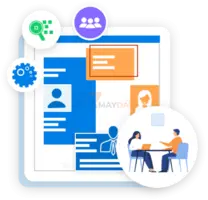Description
Best Human Resource Information System Software - Qandle
Qandle is a cutting-edge, enterprise-ready Human Resource Information System (HRIS) that helps businesses automate their day-to-day HR activities, simplify human interactions, and give actionable insights in order to create better workplaces and achieve their strategic HR goals faster and more effectively.
Qandle is a super smart cloud-based HRIS solution that covers all aspects of human resource management, from hiring through retirement. Core HR, Payroll, Talent, and Expenses are the four primary domains in which Qandle offers and helps organise a company's HR activities. Qandle also guarantees a simple and rapid setup. It can be up and running in two weeks, with all policies and personnel data in place and ready to use.
A human resource information system (HRIS) is a software or online solution used for data entry, data tracking, and data management in an organization's human resources operations. HR systems and processes must adapt to a world that is datafied, technology-driven, and people-centric, since the world of work is in constant digital upheaval. Human resource information systems have also developed in the previous decade to accommodate these new workplace patterns.
An HRIS is a broad term that encompasses a variety of systems. All aspects of managing the employee database and directory, as well as applicant tracking, benefits administration, payroll processes, work scheduling, time and attendance, leave tracking, electronic signatures, compliance protocols, customizable insight reports, employee self-service, performance management, and HR processes, are all handled through mobile apps.
Human resource information systems assist firms in automating the multifaceted complexities of HR procedures through the use of an integrated collection of HR modules. For their unified approach to addressing HR management demands, HRIS has garnered a lot of momentum among enterprises of all kinds. To avoid data duplication and provide a single source of truth, it collects, saves, maintains, and evaluates employee-related data from diverse business units. An HRIS is an excellent tool for streamlining, automating, and optimising HR procedures.
Human Resource Information System Software
Qandle is a cutting-edge, enterprise-ready Human Resource Information System (HRIS) that helps businesses automate their day-to-day HR activities, simplify human interactions, and give actionable insights in order to create better workplaces and achieve their strategic HR goals faster and more effectively.
See Qandle in Action
Work Email
Start Your Free Trial Book a Free Demo
No credit card needed
What makes Qandle the best HR Software
Here’s why you should choose qandle even before laying your eyes on any other HR software in the market:
360 Degree Feedback
You receive a complete analysis of how you perceive yourself and how others perceive you.
Compensation Management
Compensation Management Software allows you to create a base for happiness and satisfaction of your workforce that limits the labor turnover and confers a stable organization
Self Service Portal
This allows you to personalize your customer and employee experience. Address each customer or employee by name whenever they log in.
Applicant Tracking
A smart Applicant Tracking System to enable the electronic handling of your recruitment and hiring needs.
Time & Attendance Management
Track and monitor when employees start and stop work, at ease.
Employee Database
Systematic employee database to help you understand your employees and make data-based decisions in a better way.
Employee Lifecycle Management
Helps you to manage the employee's journey with the company and make it worthwhile.
Onboarding
Allows you to efficiently engage employees, and create a team that is committed to the company's success and helps retain new hires by making them feel like a member of the team
Payroll Management
This feature allows you to make sure no mistakes are made in the calculation process.
Training Management
Provides you with all that you need to increase productivity of all your employees by motivating and educating managers.
What sets Qandle apart fromother HRIS software?
Qandle is a super smart cloud-based HRIS solution that covers all aspects of human resource management, from hiring through retirement. Core HR, Payroll, Talent, and Expenses are the four primary domains in which Qandle offers and helps organise a company's HR activities. Qandle also guarantees a simple and rapid setup. It can be up and running in two weeks, with all policies and personnel data in place and ready to use.
Start Your Free Trial Book a Free Demo Now
What Is a Human ResourceInformation System (HRIS)?
A human resource information system (HRIS) is a software or online solution used for data entry, data tracking, and data management in an organization's human resources operations. HR systems and processes must adapt to a world that is datafied, technology-driven, and people-centric, since the world of work is in constant digital upheaval. Human resource information systems have also developed in the previous decade to accommodate these new workplace patterns.
An HRIS is a broad term that encompasses a variety of systems. All aspects of managing the employee database and directory, as well as applicant tracking, benefits administration, payroll processes, work scheduling, time and attendance, leave tracking, electronic signatures, compliance protocols, customizable insight reports, employee self-service, performance management, and HR processes, are all handled through mobile apps. However, it varies between client and vendor firms depending on the amount of human capital that needs to be managed, personnel strength, the geographic spread of an organisation, the basic operating procedures that it follows, and its long-term strategy.
Human resource information systems assist firms in automating the multifaceted complexities of HR procedures through the use of an integrated collection of HR modules. For their unified approach to addressing HR management demands, HRIS has garnered a lot of momentum among enterprises of all kinds. To avoid data duplication and provide a single source of truth, it collects, saves, maintains, and evaluates employee-related data from diverse business units. An HRIS is an excellent tool for streamlining, automating, and optimising HR procedures.
Why do you need an HRIS software?
An HRIS is a centralised database that stores information such as applicant tracking, onboarding, employee demographics, compensation and benefits options, time monitoring, and much more. It's also the central location for all of your personnel data, including the most up-to-date statistics on your organization's hiring and retention patterns.
With many skill sets in short supply and unemployment rates at record lows, every firm is fighting a talent war. At the same time, job seekers are interviewing for multiple companies. When dealing with candidates, this means that time is of the essence. The best candidates will be taken by more efficiently run companies if you drag things out using an outdated hiring system.
There are several processes in a multitasking setting like human resources that each require a different solution. HR would mostly require an applicant tracking system as well as solutions for new hire orientation, payroll, benefits, training support, and more when onboarding a new employee. Tracking of scheduling and timekeeping, performance management, and other facets of job success are also some other tasks an HRIS software can handle for you and your organization. And so if none of your current systems communicate with one another, you would need to make use of an HRIS platform.
Who usesHRIS software?
HR professionals primarily use an HRIS to simplify and automate HR operations in their organisations. HRs can easily onboard new hires with an HRIS because it eliminates paper paperwork and incorporates e-signatures and an online document repository. All essential employee information and records can be stored in a centralised system, preventing compliance issues. It can be used by the HR analytics team to create reports based on employee data, providing insight into how to improve people management strategies. Requests for time off and attendance can be automated, eliminating the need for spreadsheets in your organisation.
An HRIS is also used by reporting managers to better manage and help their team members. Its timesheet feature allows reporting managers to keep track of all of their employees' projects and the time they spend working on them. In addition, reporting managers use an HRIS in conjunction with HR specialists to conduct team performance reviews. They can provide effective and unbiased feedback to employees through multi-rater feedback, 360-degree reviews, continuous performance reviews, and other methods. When it comes to payroll, it is important to handle it with care in order to guarantee a positive employee experience. This is because payroll mistakes can lead to your employees losing faith in your company. That is why, in order to ensure error-free payroll processing, payroll administrators make use of an HRIS.
Benefits of using anHRIS software
Efficient Record-keeping
An HRIS is a record-keeping system that keeps track of any changes to employee information. When it comes to personnel data, the HRIS can be considered the one source of truth.
Making knowledgeable decisions
HRIS software provides users with reports that are simple to develop and distribute with managers and executives to assist them in making timely and informed decisions. Staff off-boarding trends, for example, might be used to target employee retention initiatives and prepare for future firm expansion.
Improved employee satisfaction
A well-managed HRIS can help employees have a better experience. Employees may quickly access their benefit options, review and update their information, seek time off and receive permission, and learn about their corporate culture through a user-friendly employee portal. This minimises the number of calls and visits to the HR department, as well as their sense of empowerment and irritation with long wait times. It can also help you make your onboarding process less stressful for new hires.
Improved HR planning.
The HRIS allows data to be tracked in order to develop HR and company strategies. Different data will be necessary to track depending on the organization's priorities. This is where the HRIS comes into its own.
HR Self-Service.
The ability to offer self-service HR to employees and managers enables employees to manage their own affairs. When done right, the HRIS can offer a good employee experience.
Data Retainment
For compliance purposes, some data is gathered and retained. This comprises materials for identifying employees in the event of theft, fraud, or other misbehaviors, first contact information in the event of an accident, citizens identification information for the tax office, and mandatory certification expiration dates. All of this data can be saved in the HRIS.
To know more: https://www.qandle.com/human-resource-information-system-software.html






